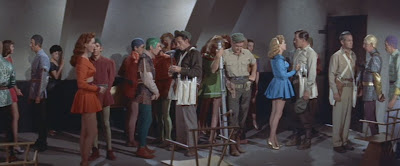A tip of the propellor beanie to old friend Arlan Andrews, for accidentally reminding me that I wrote this for our old Friday Challenge site, damn near ten years ago. It remains as relevant as ever today. Without further ado, then...
Ultimate Geek Fu: January 12, 2011
Today we approach the apotheosis of Ultimate Geek Fu, as we seek the answer to what may be the ultimatest Ultimate Geek Fu question of them all: who exactly is the
real spiritual father of Captain James T. Kirk?
Roddenberry himself said Kirk was essentially C. S. Forester's Captain Horatio Hornblower set in space, although in other contexts he also described
Star Trek as "
Wagon Train to the Stars." Personally I always considered the original show to be darned close to
Forbidden Planet: The Series, as there are some remarkable similarities. For example, the United Federation of Planets starship
Enterprise, as originally modeled, bears more than a passing resemblance to United Planets starcruiser
C57-D, with some extra bits and fins and stuff glued on:
Commanded by the heroic Captain J. J. Adams (Leslie Nielsen!)—
—ably assisted by his loyal crew, advised by his closest confidant, the ship's doctor, and supported by the brilliant engineer -slash- communications officer, Quinn—
—the
C57-D prowls about the stars, with the crew watching planets on the big screen—
—dematerializing and rematerializing as needed—
—packing totally cool zap guns—
—and of course, in the end, Captain Adams scores the hot babe.
Seems like a slam-dunk, right?
But...
But a few weeks ago I got a new four-pack of old movies. I bought it solely for
The Beast From 20,000 Fathoms, Ray Bradbury and Ray Harryhausen's early masterpiece.
Another time, perhaps, we can discuss the debts that the later
Gojira and the much later American
Godzilla movies owe to this earlier and in many respects far superior movie. But what I want to talk about right now is a surprise bonus that was also in the box: a wonderful and apparently forgotten little 1956 gem,
World Without End.
The story:
An advanced spaceship, returning from a mission to Mars, encounters a mysterious energy storm in space—
—is thrown off-course and catapulted far beyond Ludicrous Speed—
—to crash-land on a mysterious planet—
—where they discover terrible monsters—
—ugly and violent primitive hominids—
—and—
gasp!—it's the Earth!
They've been catapulted forward in time to the 25th century! Where the survivors of the great atomic holocaust live underground, in warrens of weird pastel-colored trapezoidal tunnels—
—furnished entirely with Danish Modern furniture—
—in a horrible, cramped, and dispirited world in which the men have de-evolved into pallid, effete, and badly dressed weenies—
—while the women, of course, all look like Vargas pin-up girls.
Equally of course, the women find these manly men from the past to be utterly irresistable—
—while the men take a somewhat different view.
There follow plots, machinations, betrayals, etc., etc., until at last, the studly spaceship captain—
That's right, none other than
Hugh Marlowe, who you've also seen in
Earth vs The Flying Saucers,
The Day The Earth Stood Still, and a host of other 1950s sci-fi and hard-boiled detective movies and TV series. Anyway, Marlowe stirs these effete weenies into action, rouses their long-repressed manhood and self-respect, teaches them how to make weapons and to fight, and leads them back up onto the surface—
—where he frees the slaves—
—defeats the evil
Gorn Klingon Sasquatch whatever leader in hand-to-hand combat—
—and brings the blessings of housing projects—
—and public schools—
—to the primitives. And of course, in the end—
—he scores the hottest of the hot babes.
And if
that does not definitively establish that
Hugh Marlowe is the true spiritual father of Captain James T. Kirk...
Well, then let the arguments begin.


















































